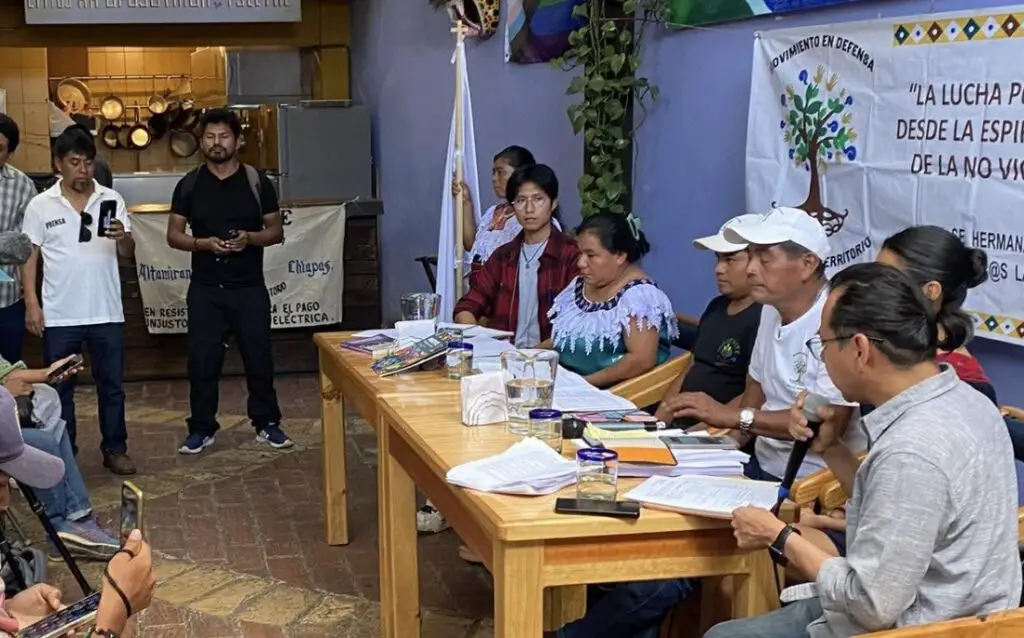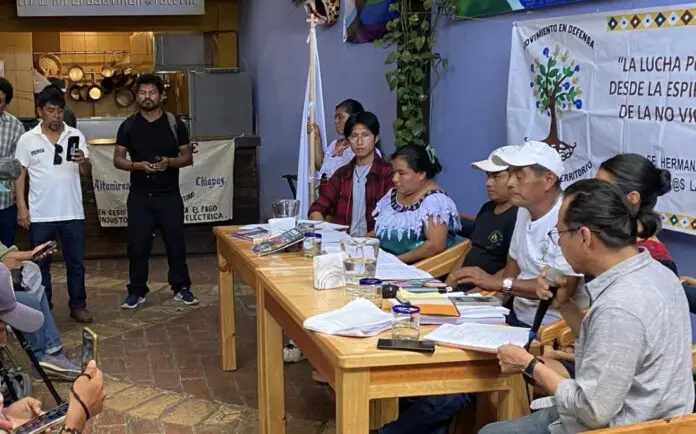Due to repeated human rights violations, 13 Mayan municipalities filed two injunctions against the guidelines for conducting public consultations and demanding information on the environmental, cultural, and social impacts related to the construction of the Palenque-San Cristóbal de Las Casas highway.
On February 17, 2025, Eduardo Ramírez, governor of Chiapas, published guidelines for public consultation in the Official State Gazette. These guidelines fail to address the effective means for indigenous communities to participate in ensuring their right to self-determination.
The following day, a call for questions regarding the construction of the first section of the Palenque-Ocosingo highway project was issued, and on March 23, three polling stations were set up in the municipal capitals of Palenque, Salto de Agua, Tumbalá, Chilón, and Ocosingo. As a result, on March 31, they filed two injunctions: the first, claiming the guidelines are unconstitutional, fundamentally due to the dual nature of discrimination against Indigenous peoples and communities.
In other words, the guidelines were not consulted with the communities and communities before being drafted and published. Their content also fails to specifically establish the participation process, and their application is uneven.
“With this first injunction, we seek to obtain recognition of the unconstitutionality (of the guidelines) and, therefore, the suspension of any unconstitutionality or any process arising from them, such as the call for proposals for the first section,” explained María Fernanda of the Ibero Puebla Legal Clinic.
The second injunction addresses the omission, the lack of information from the State regarding the Palenque to San Cristóbal highway project, since there is no information on the environmental impact.
María Fernanda recalled the Escazú Agreement, signed by Mexico, which requires all authorities to provide environmental information, which is intrinsically related to life itself and the territories of Indigenous peoples and communities.
Declaration
At a press conference, with the presence of commissions representing 13 municipalities, they read the “Declaration of Territories Free of Megaprojects,” which they sent to Eduardo Ramírez and the Ministry of Government, along with 2,000 signatures collected.
In the words of Pascuala Vázquez Aguilar of the Community Government, Mayan peoples and communities from the municipalities of Candelaria, Chilón, Bachajón, Tenejapa, San Juan Cancuc, Ocosingo, Oxchuc, Altamirano, Chicomuselo, Yajalón, Salto de Agua, and Sitalá, reject the construction of the highway due to the violations of the rights of the Mayan peoples.
“The territory has been declared a living culture and a territory free of megaprojects. This land protection is protected by international law and the Mexican Constitution.”
Domingo Miranda López, coordinator of the Movement in Defense of Life and Territory (Modevite), recalled that the struggle to defend the land began in 2013, and although they achieved a suspension, Eduardo Ramírez resumed the project.
Since the 2024 election campaigns, Morena candidates have begun to raise the possibility of resuming the project, as Marcelo Ebrard mentioned during his visit to the Autonomous University of Chiapas (Unach).
“The project, they say, is development for the people, but no, it benefits business owners. Business owners, because they have products they can transport; we are coffee growers,” Domingo stated.
Furthermore, residents are unaware of the locations where the highway will pass, since the signs marking the route were thrown from a small plane. And in the supposed referendum in Chilón, they found that the same person can vote up to three times, “which is illegal.”
Although the struggle of the Mayan communities has been peaceful and lawful, intimidation continues. They cited, for example, that in Bachajón, residents did not sign because the government conditioned them to withdraw social programs, and the warnings also target municipal employees.
Modevite reported that the day before the supposed referendum, people arrived in the community of Jalalal, Chilón municipality, to request documents, signatures, and votes for agricultural support. “These documents were manipulated.”

Source: avispa.org




